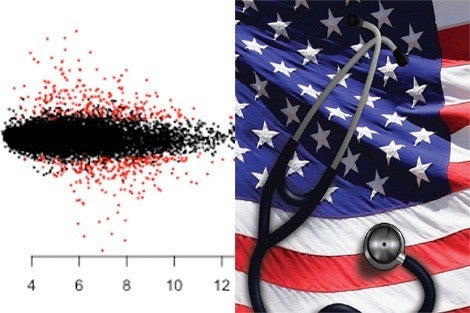March 27, 2014 — Ever wonder why Medicare has parts A, B, C and D—and did you even know it had four parts? Or how researchers deal with the massive amounts of genetic data now available that could potentially shed light on infections, cancer, and noncommunicable diseases?

Two new online courses from Harvard School of Public Health (HSPH) will provide answers to these questions and many more. “U.S. Health Policy” (PH210x) will be taught by [[John McDonough]], professor of the practice of public health in the Department of Health Policy and Management at HSPH, with help from about 20 other health policy experts from HSPH and elsewhere.

“Data Analysis for Genomics” (PH525x) will be taught by [[Rafael Irizarry]], professor of biostatistics and computational biology at the Dana-Farber Cancer Institute and professor of biostatistics at HSPH, and Michael Love, postdoctoral fellow in the Department of Biostatistics.
Both new courses—offered through HarvardX, the University’s branch of the online education platform edX—begin April 7. HSPH has run four other edX courses since fall 2013 on topics including epidemiology and biostatistics, human health and global environmental change, clinical trials, and health and society.
Making sense of the U.S. health care system
“U.S. Health Care Policy” will cover a wide range of topics during its 10-week run, such as Medicare, Medicaid, health care financing, private health insurance, health care quality, pharmaceutical policy, behavioral health policy, and medical liability. HSPH faculty who will help teach the course represent “probably the richest collection of health policy experts and stars you’re going to find in any school of public health in the world,” McDonough said.
The course will aim to help people understand how the health system works. “There’s a sense that the public doesn’t understand the Affordable Care Act well at all,” said McDonough. “But it actually goes deeper than that—the truth is that many don’t understand the U.S. health care system in general. And if you don’t understand the system, it makes it much more challenging to understand the law seeking to reform that system.”
The nuts and bolts of big data
“Data Analysis for Genomics,” an eight-week course, will help students work with the massive data sets that are now standard in research involving genetics. “Many fields that previously relied on very basic data analysis are now being transformed with data sets that are pretty big and complicated,” explained Irizarry. “ Genetic epidemiology is one of the fields greatly affected by these huge data sets.”

Love said those who sign up for the course could range from “researchers studying basic biology—people trying to figure out how cells work—to doctors who want to analyze data sets generated from their patients and who maybe haven’t taken a statistics course since college. This course will offer a basic introduction to statistics and information on how to use a computer to analyze data.” Those who take the course are required to have some background in quantitative research methods and computer programming; details can be found on the course web page.
Irizarry thinks the online course will provide valuable skills for working scientists who typically spend all day in the lab and are unable to enroll in traditional classes. “This class will allow them to go at their own pace, so it should be a big help to them.”
Learn more
HSPH edX courses help train workers in India (HSPH news)
HarvardX’s fall course lineup includes new HSPH offerings (HSPH news)
